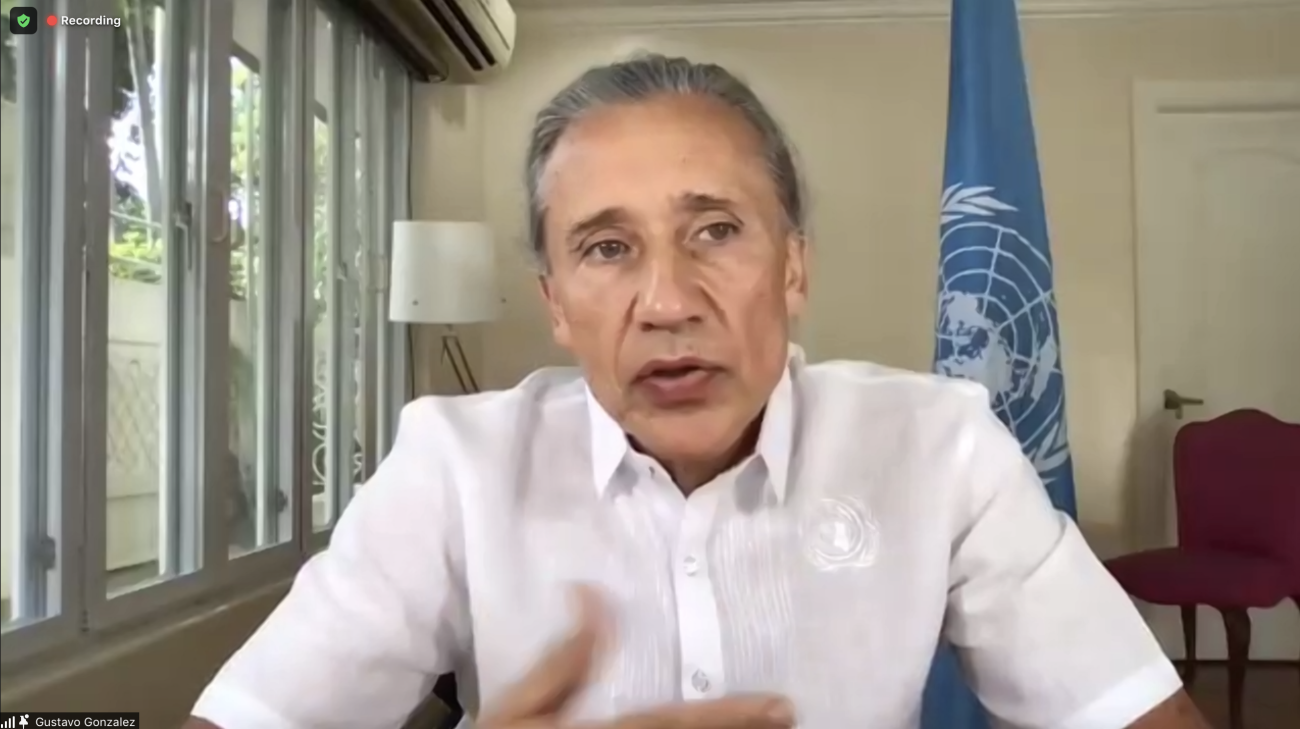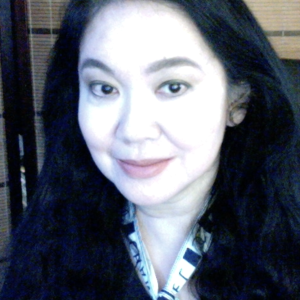UN plans $100M contribution to BARMM, says UN Phl chief at BARMM donors forum

The overall planned contribution in BARMM is about USD100 million and 12 UN agencies, programmes and funds are delivering interventions in the BARMM
COTABATO CITY, 13 December 2021--The First BARMM Donors’ Forum was organized today to present to present the Bangsamoro Response and Recovery Plan (BRRP) 2020-2022 for CoVid-19 and to present to development partners the thrust and priorities of the Bangsamoro Government.
The Forum was led by BARMM Chief Minister Ahod Ebrahim, Director-General Mohajirin T. Ali of the Bangsamoro Planning and Development Authority, BARMM Senior Minister Abdulraof Macacua; Speaker of the Bangsamoro Government MP Ali Pangalian Balindog; Minister of Basic, Higher and Technical Education Mohagher Iqbal, and representatives of the National Economic and Development Authority (NEDA) and the Office of the Presidential Adviser on the Peace Process.
UN Philippines Resident Coordinator Gustavo Gonzalez participated in the forum, along with other representatives of resource partners, including the Head of Cooperation of the EU Delegation to the Philippines Christopher Wagner and World Bank Country Director for the Philippines Dr. Ndiame Diop
The text of Mr. Gonzalez's message [as prepared] follows:
Distinguished Guests,
Ladies and Gentlemen,
Before anything, let me congratulate you for this important and timely first Resource Partners’ initiative, which we The United Nations System fully support. This support is the continuation of the decades-long engagement the United Nations System has had in the southern Philippines spanning across the humanitarian-development-peacebuilding spectrum.
Today, we are gathered here because we all look toward a brighter future. The future that we are looking at is that of lasting peace in the BARMM region and the other parts of the Philippines. We are your partners in realizing the aspirations of your people who aspire to longer term stability and development.
You will also recall that the United Nations System in the Philippines proceeded with a comprehensive revision of its cooperation framework with the Government. The revision was an effort to realign priorities with the government’s COVID-19 response and recovery efforts and responding to the imperative need for sustaining peace, more particularly in the BARMM.
The revised framework, the Socioeconomic and Peacebuilding Framework (SEPF) constitutes the main framework of UN’s contribution to the achievement of sustainable development in the Philippines and also serves as our COVID-19 response and recovery plan. It is articulated around three mutually reinforcing pillars, bringing together investment in people, sustaining peace and preserving the planet.
The overall planned SEPF contribution in BARMM is close to USD100 million. It is also important to note that UN interventions in BARMM represent around sixty-five per cent of all UN interventions across the country. This highlights the level of priority the UN System gives to the achievement of a successful transition and lasting peace in the region.
Currently, twelve UN agencies, programmes and funds are delivering interventions in the BARMM region. Many of these interventions are delivered through joint programs to ensure coherence and complementarity, building on each agency’s specialization and mandate. The support provided by agencies, funds, and programs of the United Nations System to BARMM include delivery of services and technical assistance in various sectors of intervention, such as inclusive and accountable governance, decent employment generation and essential services of health, education, security, and the justice sector. All these programs aim at consolidating peace gains by reducing the legacy of armed conflict on the lives of the populations, including women and children, who often bear the brunt of the atrocities.
These interventions also contribute to addressing the drivers of fragility, reducing vulnerabilities, developing preparedness and preventative mechanisms by building stronger household, community, and institutional resilience by developing greater convergence and coherence across the humanitarian, development, and peace spectrum through joint programs. And through joint programming, the UN hopes to support the BARMM authorities in addressing the major challenges to development, peace, and stability by using the comparative advantage offered by each of the agency, fund, and programme of the UN system. I am pleased to tell you that the number of joint programs has increased from two (2) before 2019 to six (6) in 2021. This, not only shows that the UN wants to deliver as one, but also achieve a greater and sustainable impact.
I will not mention all the programs UN agencies have been delivering in BARMM, but allow me to highlight some of the most significant and visible ones:
- Building on the Norway-funded ARISE project, the PBF-funded Joint Program on Promoting conflict prevention, social cohesion, and community resilience in BARMM in the time of COVID-19 that focuses on mainstreaming the Women, Peace and Security agenda in the BARMM. The Joint Program will promote the agency of women ex-combatants and women peacebuilders. It also aims at building the capacity of BARMM ministries and LGUs to mainstream conflict prevention and peacebuilding in their programs and policies and strengthening the resilience of conflict-affected communities in conflict hotspots.
- The Joint Program on Ensuring inclusive and risk-informed shock-responsive social protection resulting in more resilient communities in BARMM funded by the Joint SDG Fund, which is being scaled up with Australia’s DFAT funding. This JP provides the technical support and taps on international best practice to develop an innovative social protection program that addresses the shocks and impacts on the most vulnerable that is unique to BARMM.
The work of the UN would have not been possible without the unwavering support from our bilateral and multilateral development partners, who are represented in this important forum: Australia, Germany, Japan, Spain, Norway, Canada, New Zealand, Korea, and EU. Let me say, on behalf of the entire UN system in the Philippines, a BIG THANK YOU. Without your financial contributions we would have not been able to deliver the much-needed services to those that need them the most and would have not been able to share the above figures of how much we have achieved, even modestly.
We also appreciate the close partnership we have built with the World Bank and the Asian Development Bank in recognition that we are multiple.
As you can see from UN’s work and efforts by partners, there was an immediate need for coordination. Through the Bangsamoro Roadmap group, the UN and World Bank are working with development partners to better align our main initiatives in BARMM around the Peace agreement’s priorities and we see today’s forum as an opportunity to work together and coordinate our efforts with you. It is in line with efforts to streamline UN coordination in the BARMM and Mindanao that a UN Area Coordinator, representing the Resident Coordinator in Cotabato has been appointed and joined his position end of November this year. His role is not only to strengthen coordination among various UN entities operating in the BARMM but also provide coordination support to other development partners supporting the transition. It is our vision that the UN Area Coordination Office will also serve as coordination secretariat in support to our bilateral and multilateral development partners and will closely work with relevant BARMM entities and institutions with development coordination mandate, such as the Bangsamoro Planning and Development Authority (BPDA) to ensure our support is coherent and is in line with the country’s and region’spriorities. We believe that the enhanced coordination of development partners’ contribution to the transition and beyond will bring greater impact to efforts that the national government and the BARMM authorities are deploying and will lead to greater transparency and accountability.
We all know the socio-economic impact of COVID-19 in the country, especially on the BARMM, which was and still is a region in transition. We also know how the outbreak impacted the progress of the BARMM transition. With the support from the UN, the BARMM government, was able to scale up health and socioeconomic action to address the impact of COVID-19 on vulnerable and fragile communities in the region in 2020. The UN also successfully assisted BARMM to finalize a regional recovery plan and to ensure planning for recovery by its constituent LGUs, including through a socio-economic assessment of the impact of COVID-19.
I am also proud to say that we were able to provide medical and other equipment to secure an isolation area in BARMM’s regional health center, Cotabato Regional Medical Center. We also supported the strengthening of the cold chain management capacity and COVID-19 vaccination preparedness through the provision of key medical equipment and supplies, a series of training for frontline health workers, and strengthened disaster risk reduction management planning at the municipal and barangay level. The UN’s approach to supporting the BARMM is therefore an integrated approach, addressing the need for responding to COVID-19 since March 2020 while also assisting in keeping the peace process on track.
Allow me to end my message with my recent visit to Cotabato, where I met with key stakeholders, including those affected by natural disasters and those displaced by cycles of armed conflicts that have torn the region in the most recent past and robbed the many development opportunities and potential it presents. From my meetings, a few things that need to be noted emerged:
- Expectations for a successful transition are very high among the population and the civil society. It is important that we use the opportunity offered by the extension of the transition period to 2025 to make gains in meeting at least basic aspirations of Bangsamoro people.
- There is a need for greater coordination among various actors intervening in the transition process and ensuring that our interventions become catalytic to sustainable peace and stability by through the reflection the priorities of the BARMM and the Bangsamoro people.
- In this regard, I would like to inform you that the UN System in the Philippines are working towards higher convergence and complementarity though joint programming. One of these flagship joint programs is the UN Joint Program on Conflict Transformation, which we hope to discuss with Development Partners and BARMM authorities in coming days.
- The United Nations System is planning to inaugurate the new UN Area Coordination Office in February 2022. This office will offer a great opportunity enhanced dialogue among development partners, civil society, private sector and with BARMM authorities.
I do hope this forum will lead to enhanced commitment among development partners and I assure you that the United Nations System will accompany you in this journey through the transition and beyond.
Thank you for your attention!
The recording of the Forum is found on the Bangsamoro Government's Facebook Page: https://www.facebook.com/thebangsamorogovt/videos/582774189498602
Written by











